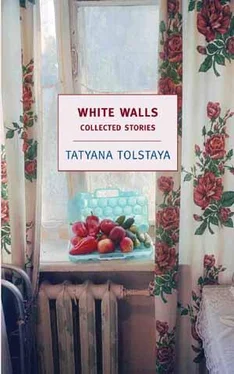It’s not clear what happened next. First of all, hardly anyone was interested; and secondly, Ada Adolfovna isn’t very talkative, besides which, as I’ve already said, there’s time! Time has devoured everything. Let’s add that it’s hard to read other people’s souls: it’s dark and not everyone knows how to do it. Vague conclusions, attempts at answers—nothing more.
I doubt Sonya received Nikolai’s graveside song. Letters didn’t get through that black December, or else took months. Let’s suppose that raising her eyes, half-blind with starvation, to the evening star over bombed-out Pulkovo, she did not feel the magnetic gaze of her beloved that day and realized his hour had come. A loving heart—say what you will—feels such things, you can’t trick it. And realizing that it was time, ready to turn to ashes in order to save her one and only, Sonya took everything she had—a can of prewar tomato juice, saved for a matter of life and death like this—and made her way across all of Leningrad to the dying Nikolai’s apartment. There was exactly enough juice for one life.
Nikolai lay under a mound of coats, in a hat with ear flaps, with a horrible black face, caked lips, but smooth-shaven. Sonya sank to her knees, pressed her eyes to his swollen hand with its broken fingernails, and wept a bit. Then she spoon-fed him some juice, threw a few books onto the fire, blessed her lucky fate, and left with a pail to get some water, never to return. The bombing was heavy that day.
That, basically, is all that can be said about Sonya. A person lived—a person died. Only the name remains.
“Ada Adolfovna, give me Sonya’s letters.”
Ada Adolfovna rolls from the bedroom to the dining room, turning the big wheels of her chair with her hands. Her wrinkled face twitches. A black dress covers her lifeless legs to her toes. A large cameo is pinned near her throat, someone is killing something on it: shields, spears, the enemy gracefully fallen.
“Letters?”
“Letters, letters, give me Sonya’s letters!”
“I can’t hear you!”
“She never can hear the word ‘give,’” her nephew’s wife hisses in irritation, narrowing her eyes at the cameo.
“Isn’t it time for dinner?” Ada Adolfovna smacks her lips.
What large dark cupboards, what heavy silverware in them, and vases, and all kinds of supplies: tea, jam, grains, macaroni.
In the other rooms there are more cupboards, cupboards, chiffonniers, wardrobes—with linens, books, all kinds of things. Where does she keep the packet of Sonya’s letters, an old package wrapped with twine, crackling with dried flowers, yellowed and translucent like dragonfly wings? Does she not remember, or does she not want to tell? And what’s the point in pestering a trembling paralyzed old woman? Didn’t she have enough hard days in her life? Most probably she threw the packet into the fire, standing on her swollen knees that icy winter, in the blazing circle of a minute’s light, and perhaps the letters, starting slowly at first and then quickly blackening at the corners and finally swirling up in a column of roaring flames, warmed her contorted, frozen fingers, if only for a brief instant. Let it be so. But she must have taken the white dove out of there, I think. After all, doves don’t burn.
Translated by Antonina W. Bouis
Filin turned up—unexpectedly as always—on the phone, with an invitation to have a look at his new flame. The evenings program was clear: a crisp white tablecloth, light, warmth, special puff-pastry pirozhki à la Tmutarakan, the nicest music coming from somewhere in the ceiling, and engrossing conversation. Blue curtains everywhere, cupboards with his collections, beads hanging along the walls. Then there might be new toys: a snuffbox with a portrait of a lady in transports over her own pink naked powderiness, a beaded purse, perhaps an Easter egg, or something else useless but valuable.
Filin wasn’t offensive to the eye, either—clean, not large, wearing an at-home velvet jacket, a small hand weighted down with a ring. And not a clichéd, corny, “ruble fifty with the box” ring—why no, his is straight from an excavation, Venetian if he’s not lying, or a setting of a coin from, God help me, Antioch, or something even grander than that…. That was Filin.
He’ll sit in a chair dangling his slipper, fingers folded in a tent, eyebrows like pitch—marvelous Anatolian eyes like soot, a dry silvery beard that rustled, black only around the mouth, as if he had been eating coal.
Plenty to look at.
Filin’s women weren’t run-of-the-mill, either—collector’s rarities. Either a circus performer, say, twisting on a trapeze silvery scales shimmering, to a drum roll; or simply a young woman, a mama’s girl who dabbled in water colors, a brain the size of a kopek but dazzlingly white, so that Filin, in issuing his invitation to view, will warn you to bring sunglasses to avoid snow blindness.
Some people privately didn’t approve of Filin, with all those rings, pastries, and snuffboxes; they giggled over his raspberry robe with tassels and those supposedly silver Mongol slippers with turned-up noses; and it was funny that in his bathroom he had a special brush for his beard and hand cream: a bachelor… But whenever he called, they came; and secretly always worried: would he invite them again? Would he let them sit in the warmth and light, in comfort and luxury, and in general— what did he ever see in us ordinary people, what does he need us for?
“If you’re not busy tonight, please come at eight. Meet Alisa, a cha-arming creature.”
“Thank you, thank you, of course.”
Well, as usual, at the last minute! Yura reached for his razor, and Galya, slithering into her panty hose like a snake, left instructions with her daughter: the kasha is in the pot, don’t open the door to anyone, do your homework, and straight to bed. And don’t hang on me, let go, we’re late already. Galya stuffed plastic bags into her purse: Filin lived in a high-rise, with a grocery store on the ground floor; maybe they’ll have herring oil, or something else.
Beyond the house the boundary road lay like a hoop of darkness where the frosty wind howled, the cold of uninhabited plains penetrated your clothes, and the world for a second seemed as horrible as a graveyard; and they didn’t want to wait for a bus or be squashed in the metro and they got a taxi; and lounging comfortably, cautiously berated Filin for his velvet jacket, for his collector’s passion, for the unknown Alisa: where’s the last one, that Ninochka? nowhere to be found now; and wondered whether Matvei Matveich would be there, and roundly denounced Matvei Matveich.
They had met him at Filin’s and were charmed by the old man: those stories of his about the reign of Anna Ivanovna and those pastries, and the steam from English tea, and blue-and-gold collector’s cups, and Mozart bubbling from somewhere up above, and Filin caressing the guests with his Mephistophelian eyes—and, oh, heads spinning—they got Matvei Matveich to invite them. Some visit! He received them in the kitchen, the floor was made of planks, the walls brown and bare, a horrible neighborhood, nothing but fences and potholes, and he was wearing jogging pants that were threadbare and the tea was stale and the jam crystallized, and he just thumped the jar on the table, stuck a spoon in it—dig it out yourselves, dear guests. And you had to smoke on the landing: asthma, please understand. And Anna Ivanovna was a flop, too. They sat down—the hell with the tea—to listen to his purring speech about palace intrigues, all kinds of revolts; but the old man kept untying these awful folders and poking them with his finger shouting about land reform and that Kuzin, the mediocrity clerk backstabber, won’t let him get published and has set the whole department against Matvei Matveich, but here, here: invaluable documents, he’d been collecting them all his life. Galya and Yura wanted to hear about villains, torture, the ice house, and the dwarf wedding, but Filin wasn’t there to steer the conversation to interesting topics, and all they heard that evening was Ku-u-zin! Ku-u-uzin! and the finger-jabbing of the files, and the valerian sedative drops. They put the old man to bed and left, and Galya tore her panty hose on the old man’s chair.
Читать дальше












